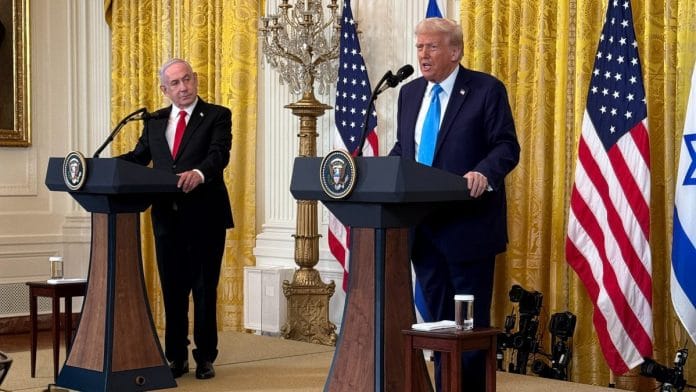American President Donald Trump, never one to shy away from outlandish proposals, has now floated the idea of a US-led takeover of Gaza—one that involves removing Palestinians from their own land and shipping them off elsewhere. The idea isn’t new. Last year, Jared Kushner—Trump’s son-in-law and former aide—casually described Gaza as “valuable” waterfront property, as if it were a prime real estate opportunity rather than the shattered home of millions. Now, after 16 months of Israeli bombardment that has killed over 47,000 people and left Gaza in ruins, Trump is taking that logic a step further. His vague promise of turning Gaza into the “Riviera of the Middle East” is, for many, nothing more than a plan for ethnic cleansing.
According to Trump, Gaza is a “hell”, questioning why anyone would want to live there. But his claim that Gazans do not wish to return falls apart in the face of reality. In the aftermath of the ceasefire, thousands of displaced Palestinians have made their way back to North Gaza, despite their homes being reduced to rubble. It’s a no-brainer that this isn’t about comfort but belonging for the people of Palestine. No amount of devastation can erase people’s deep-rooted connection to their land. Most people do not willingly leave their homes unless they have no other choice.
Personally, I haven’t had many direct interactions with displaced communities, but from the Kashmiri Pandits I have interacted with, one thing was clear to me—decades later, they still carry the pain of losing their homeland, of only being able to return as visitors. Displacement isn’t just about losing a house; it’s about losing history, roots, and a sense of belonging. The idea that Gazans would simply abandon their land as if it were an inconvenient burden ignores this fundamental human truth.
Also Read: Maha Kumbh Mela is about India, not just Hindus. Don’t dismiss it as outdated
Trouble for Saudi-Israel deal
While Trump’s statement has drawn global outrage—including a warning from the UN chief against ‘ethnic cleansing’—what seems to have truly hit a roadblock is the much-hyped Saudi-Israel normalisation.
The Saudi Foreign Ministry swiftly reaffirmed Riyadh’s “firm and unwavering” stance on Palestinian statehood, calling it “non-negotiable and uncompromising”. For months, Washington had pushed for a historic Saudi-Israel deal, hoping to reshape regional alliances. But Trump’s vision of a depopulated Gaza has only reinforced the kingdom’s red lines, making any breakthrough even more unlikely.
It seems that Hamas has, to some degree, achieved one of its strategic objectives: keeping the confrontation with Israel alive and preventing normalisation efforts.
Also Read: Trudeau’s fall shows there’s no place for lazy, knee-jerk liberal politics in the West anymore
A bargaining ploy?
Trump’s new approach also comes across as purely transactional. When he called the US “taking over” Gaza a “long-term ownership position”, it sounded less like foreign policy and more like a businessman looking out for his own interests. And frankly, that language will play well with some of his supporter base—those who see the world purely from the point of view of American self-interest.
However, chances are that, in keeping with his self-image as a shrewd dealmaker, Trump was simply laying out an extreme position as a bargaining ploy. His approach often involves pushing the most outrageous proposal—one that Palestinians and much of the world will reject outright—to make any alternative seem reasonable by comparison.
It’s a strategy he’s used before: create fear of losing everything so the other side feels pressured to accept whatever is offered. This aligns perfectly with his image of strength—portraying himself as a leader who forces opponents to the table on his terms rather than negotiating from a position of compromise. To his MAGA base, this isn’t just policy; it’s a demonstration of power. Proof that Trump doesn’t negotiate, but dominates.
In the end, Trump’s proposal seems to go against what most Americans actually want.
After years of disastrous wars in Iraq and Afghanistan, public opinion is firmly against getting tangled up in another foreign conflict. Trump himself has spent his campaign railing against “forever wars”, promising to keep the US out of costly military entanglements. Some of his supporters might cheer the tough-guy, dealmaker rhetoric. But the bigger question here is whether the broader American public is actually ready to back another Middle Eastern project, especially one as reckless as Trump’s proposal for Gaza.
Amana Begam Ansari is a columnist and TV news panelist. She runs a weekly YouTube show called ‘India This Week by Amana and Khalid’. She tweets @Amana_Ansari. Views are personal.
(Edited by Asavari Singh)







The Palestinians were displaced by the newly formed Israel who then proceeded to grab land that was allocated to Palestinians. The Palestinians were the most educated of the Arabs at that time. They were reduced to being second class citizens in other courtries. They naturally were deeply aggreived. Turning to terrorrism and extremism was a folly for which they are paying. They do not want Israel but that country is a reality. There has to be a better solution that doing away with the these long suffering residents of the land. There has to be a better way of ensuring that Israel is no longer a target of terrorrism. Perhaps a paradigm shift away from ethnocentric nationalism is required.
Trump’s idea is the best possible solution to the issue of terrorism emanating from the Gaza Strip. The Arabs, if allowed to resettle in Gaza, will invariably indulge in violent terrorist activity against Israel. To eliminate this threat to the Jewish people permanently, it’s mandatory to ensure that the Arabs are not allowed to resettle in the Gaza Strip.